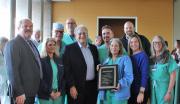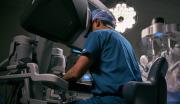
Knee replacement surgeries are a daily occurrence for Dr. Stephen Zabinski and his fellow orthopedic surgeons at Shore Orthopaedic University Associates (SOUA) in Somers Point. “Knees are by far the most common of all joints that are replaced,” said Dr. Zabinski who has been performing knee replacement surgery for more than 20 years. “Knees are also the joint most commonly affected by osteoarthritis. They are also the most subjective to sports injury and most affected by weight. Those factors can wear the knees away.”
Most patients will visit SOUA with complaints of discomfort from osteoarthritis, though there are many forms of arthritis that negatively impact joints and bones. Osteoarthritis is the most common form of arthritis in the knee. It is a degenerative, “wear-and-tear" type of arthritis where the cartilage gradually wears away. It occurs most often in people age 50 and older, but may occur in younger people as well, according to the American Academy of Orthopaedic Surgeons. Dr. Zabinski added that genetics also plays a factor and said people who tend to sit cross-legged as they eat, or kneel often may have significant discomfort in their knee simply because they are putting a lot of additional stress on the knee itself.
For patients like Louis Cullen, who at 80 years of age is still detailing cars and enjoys being outside, the knee pain he was experiencing caused him to seek help with Dr. Zabinski to see about relieving the pain in his knees and getting back to his life and the things he enjoys.
Getting ready for surgery
But the surgeon said there is a lot a patient has to do to be ready so that they optimize their outcome and hasten recovery. Because of the nature of this operation, there are a lot of factors that need to be discussed prior to surgery that will contribute to the patient’s optimum success, according to Dr. Zabinski. “If they have a problem with urinary retention, I direct them to work with their urologist. If they are overweight, they will need to go on a diet and try to lose some weight. And all my patients know, they must be nicotine free for six weeks. Not just cigarettes or cigars but also nicotine patches, gum and over-the-counter nicotine products.” Dr. Zabinski said nicotine limits the micro circulation and inhibits the healing process. “All of my patients must be nicotine free.”
Key to recovery
How the knee is replaced is the key to recovery, according to Dr. Zabinski. The effort is all about getting the patient back to life, back to work and back to the things they enjoy as quickly as possible and with the least amount of pain. When getting a total knee replacement, Dr. Zabinski said he employs a technique that spares the sub-bastius quadriceps muscle. He said the technique allows him to create a window in the knee, slide the muscle and put the knee in place. He added that patients will have 80 percent less pain and a faster rehabilitation.
Orthopedic surgeon Dr. Fred Dalzell, also with SOUA, has been performing knee replacement surgeries for more than 30 years. He said the minimally invasive techniques perfected have had the biggest improvement over the years. “We are now able to spare tendons, make smaller incisions and improve the degree to which the patient is able to bend their knee and really get back to their life,” said Dr. Dalzell.
As Dr. Dalzell explained, there is an art as well as science to the knee replacement that results in better balance for the patient. When they go into surgery there are many choices for the surgeon to find the perfect fit for their patient. Everything the surgeon does is custom to that particular patient and their exact needs. Dr. Dalzell said they take into account how the femur and tibia connect and how the knee will fit exactly to have the best outcome for the patient. “One of the things I really like about doing knee replacements is that it is a happy specialty. I have patients that come to me with significant pain and I am able to do something to help them feel better. Helping my patients keeps me looking forward to coming to work every day,” said Dr. Dalzell. Zabinski weighed in as well, saying, “Seeing a patient come in who is limited and then seeing them happy and getting back to their lives is the most rewarding thing a surgeon could ask for.”
Recovery from knee replacement
Both Dr. Zabinski and Dr. Dalzell agreed that the recovery following knee replacement surgery is not as quick as a hip replacement. Dr. Zabinski said normally patients are heading home the second day following surgery and he advises them to take five days for rest and recovery of the knee. “Healing is the priority and knees take longer to heal because the tissue that you don’t see needs to heal,” said Dr. Zabinski. He added that he likes his patients to be home and encourages them to enjoy nature because that hastens healing the spirt as well as the body. Dr. Dalzell said that the nature of the repair made to the knee makes it a longer recovery. The range of motion that is required of the knee takes some time for it to be successful.
Dr. Zabinski said following replacement surgery, the patient will need physical therapy, something Louis Cullen weighed in on. “Had I known how little pain I would have when I woke up from the surgery I would have gone sooner,” said Cullen. “As long as you follow the directions and go to physical therapy, you are going to be good. If you don’t go, you are going to be lost.”
When osteoporosis is present
Orthopedic surgeon Dr. George Alber of SOUA said when patients have osteoporosis it does not interfere with the joint replacement surgery. But, he added, he advises his patients to follow up with the Shore Physicians Group Rheumatology specialists. “We treat the fracture and the joint replacement and then connect our patients with a specialist that will be able to better treat the osteoporosis.”
For more information on joint replacement or Shore Orthopedic University Associates, located at 24 MacArthur Blvd. Somers Point, call 609-927-1991, visit www.shoreorthopaedic.com or look for them on Facebook. Shore Orthopedic University Associates include Dr. Stephen Zabinski, Dr. John McCloskey, Dr. Gene DeMorat, Dr. Richard Islinger, Dr. George Alber, Dr. Thomas Barrett, Dr. Stanley Marczyk, Dr. Frederick Dalzell, Dr. Damon Greene, Dr. Charles Krome, Dr. Ira Fox, and Dr. Ted Lai.
For more information on Shore Physicians Group Rheumatology specialists located at 401 Bethel Road in Somers Point, visit www.shorephysiciansgroup.com or call 609-365-6200.










